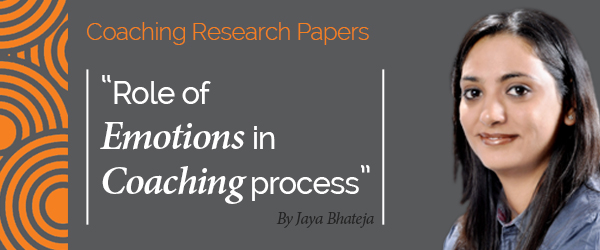 Research Paper By Jaya Bhateja
Research Paper By Jaya Bhateja
(Executive Coach, INDIA)
Introduction
With the complexities of today’s world it is imperative for coaches to have Emotional Intelligence along with the other coaching competencies. It is often noticed that there are Coaches who are excellent in navigating the coaching process however they find it difficult to connect with the client emotionally. This paper throws light on the importance of emotions and concludes it with some recommendations for coaches or anybody dealing with people to be able to connect with them effectively.
This paper focuses on different aspects of emotions. It starts with explaining in brief what are emotions? Since coaching process involves decision making approach, the paper focuses on the role of emotions in the decision making process. Post that explains the benefits of emotional decisions.
The second part of the paper revolves around the relation between emotions and coaching process. It starts with importance of Emotional Intelligence and the research statistics around the same and then dwells into the role of emotion in decision making process. At the end the paper focuses on some of the methods to help coaches deal with emotions.
I hope you find the research interesting. Happy reading!
Phase 1: How does emotion work?
What is emotion?
As per Oxford English Dictionary emotion is defined as
Any agitation or disturbance of mind, feeling, passion; any vehement or excited mental state.
Research continues to argue over precisely which emotions can be considered primary-the blue, red, and yellow of feeling from which all blends come-or even if there are such primary emotions at all. Some theorist proposes basic families, though not all agree on them.
The main categories are Anger, Sadness, Fear, Enjoyment, Love, Surprise, Disgust, and Shame.
There are hundreds of emotions, along with their blends, variations, mutations, and nuances, Indeed, there are many more subtleties of emotion than we have words for.
The picture shows some of the emotions defined.
How does emotion help in decision making?
Dr. Antonio Damasio, a neurologist known for his work on the relationship between emotions and decision making, suggests that emotions may be fundamental to dealing with equal options and decisions that do not have a clear rational basis for choosing. Decision-making is a cognitive process where the outcome is a choice between alternatives. We often have different preferences as to our preferred, approach, varying between thinking and feeling.
Video by Antonio Damasio
When Emotions Make Better Decisions
Logical decision-making
When we use logic to make decisions, we seek to exclude emotions, using only rational methods, and perhaps even mathematical tools. The foundation of such decisions is the principle of utility, whereby the value of each option is assessed by assigning criteria (often weighted).
Emotional decision-making
A totally emotional decision is typically very fast. This is because it takes time (at least 0.1 seconds) for the rational cortex to get going. This is the reactive (and largely subconscious) decision-making that you encounter in heated arguments or when faced with immediate danger.
Common emotional decisions may use some logic, but the main driving force is emotion, which either overrides logic or uses a pseudo-logic to support emotional choices (this is extremely common). Another common use of emotion in decision is to start with logic and then use emotion in the final choice.
Advantages of emotional decision making
Research has revealed a number of positive elements of emotions in decision making.
Emotional decision making also come with a word of caution.
Phase 2: Emotions and the Coaching process
In Emotional Intelligence, Daniel Goleman helped redefine what it means to be smart. He asserted that EQ (a combination of self-awareness, self-regulation, motivation, empathy, and interpersonal skills) is more important than IQ in corporate success — and subsequent research backs this up. In Developing Management Skills, David Whetten and Kim Cameron summarize this research.
A study of UC Berkeley Ph.D.’s over 40 years found that EQ was four times more powerful than IQ in predicting who achieved success in their field – even for hard scientists. A McBer study comparing outstanding managers with average managers found that 90 percent of the difference was accounted for by EQ. In a worldwide study of what companies were looking for in hiring new employees, 67 percent of the most desired attributes were EQ competencies. In a study of highly emotional intelligent partners in a consulting firm … the high EQ partners contributed more than twice as much revenue to the company as did the low EQ partners.
If you as a coach have a high emotional intelligence you can recognize the emotional state of others and engage in a way that draws them towards future thinking process to be able to think into multiple directions to learn about their potential. As known the underlying principle of coaching process is to support client in thinking forward by minimizing the underlying beliefs which might be blocking to seek directions, the emotional Intelligence can do wonders in the coaching process. There are already many tools used to leverage the emotional mind to take decisions like visualization, visioning, wheel of life, success life line etc.
Video by Daniel Goleman
Daniel Goleman Explains Emotional Intelligence
Why is emotional intelligence (EQ) so important?
Emotional intelligence affects:
In order to permanently change behavior in a way that stand up under pressure, coach need to learn how to leverage the powerful emotional parts of the brain that remains active and accessible even in times of stress. This means that you can’t simply read about emotional intelligence in order to master it. You have to experience and practice the skills in your everyday life to be able to deal with it.